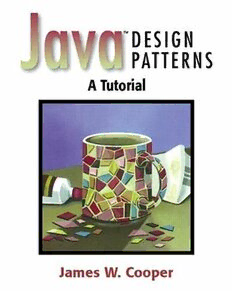Download Java(TM) Design Patterns: A Tutorial( PDF Free - Full Version
Download Java(TM) Design Patterns: A Tutorial( by James W. Cooper in PDF format completely FREE. No registration required, no payment needed. Get instant access to this valuable resource on PDFdrive.to!
About Java(TM) Design Patterns: A Tutorial(
Design patterns have become a staple of object-oriented design and programming by providing elegant, easy-to-reuse, and maintainable solutions to commonly encountered programming challenges. However, many busy Java programmers have yet to learn about design patterns and incorporate this powerful technology into their work. Java(tm) Design Patterns is exactly the tutorial resource you need. Gentle and clearly written, it helps you understand the nature and purpose of design patterns. It also serves as a practical guide to using design patterns to create sophisticated, robust Java programs. This book presents the 23 patterns cataloged in the flagship book Design Patterns by Gamma, Helm, Johnson, and Vlissides. In Java(tm) Design Patterns, each of these patterns is illustrated by at least one complete visual Java program. This practical approach makes design pattern concepts more concrete and easier to grasp, brings Java programmers up to speed quickly, and enables you to take practical advantage of the power of design patterns. Key features include: * Introductory overviews of design patterns, the Java Foundation Classes (JFC), and the Unified Modeling Language (UML) * Screen shots of each of the programs * UML diagrams illustrating interactions between the classes, along with the original JVISION diagram files * An explanation of the Java Foundation Classes that illustrates numerous design patterns * Case studies demonstrating the usefulness of design patterns in solving Java programming problems * A CD containing all of the examples in the book, so you can run, edit, and modify the complete working programs After reading this tutorial, you will be comfortable with the basics of design patterns and will be able to start using them effectively in your day-to-day Java programming work.
Detailed Information
| Author: | James W. Cooper |
|---|---|
| Publication Year: | 2000 |
| ISBN: | 201485397 |
| Pages: | 278 |
| Language: | English |
| File Size: | 4.732 |
| Format: | |
| Price: | FREE |
Safe & Secure Download - No registration required
Why Choose PDFdrive for Your Free Java(TM) Design Patterns: A Tutorial( Download?
- 100% Free: No hidden fees or subscriptions required for one book every day.
- No Registration: Immediate access is available without creating accounts for one book every day.
- Safe and Secure: Clean downloads without malware or viruses
- Multiple Formats: PDF, MOBI, Mpub,... optimized for all devices
- Educational Resource: Supporting knowledge sharing and learning
Frequently Asked Questions
Is it really free to download Java(TM) Design Patterns: A Tutorial( PDF?
Yes, on https://PDFdrive.to you can download Java(TM) Design Patterns: A Tutorial( by James W. Cooper completely free. We don't require any payment, subscription, or registration to access this PDF file. For 3 books every day.
How can I read Java(TM) Design Patterns: A Tutorial( on my mobile device?
After downloading Java(TM) Design Patterns: A Tutorial( PDF, you can open it with any PDF reader app on your phone or tablet. We recommend using Adobe Acrobat Reader, Apple Books, or Google Play Books for the best reading experience.
Is this the full version of Java(TM) Design Patterns: A Tutorial(?
Yes, this is the complete PDF version of Java(TM) Design Patterns: A Tutorial( by James W. Cooper. You will be able to read the entire content as in the printed version without missing any pages.
Is it legal to download Java(TM) Design Patterns: A Tutorial( PDF for free?
https://PDFdrive.to provides links to free educational resources available online. We do not store any files on our servers. Please be aware of copyright laws in your country before downloading.
The materials shared are intended for research, educational, and personal use in accordance with fair use principles.

